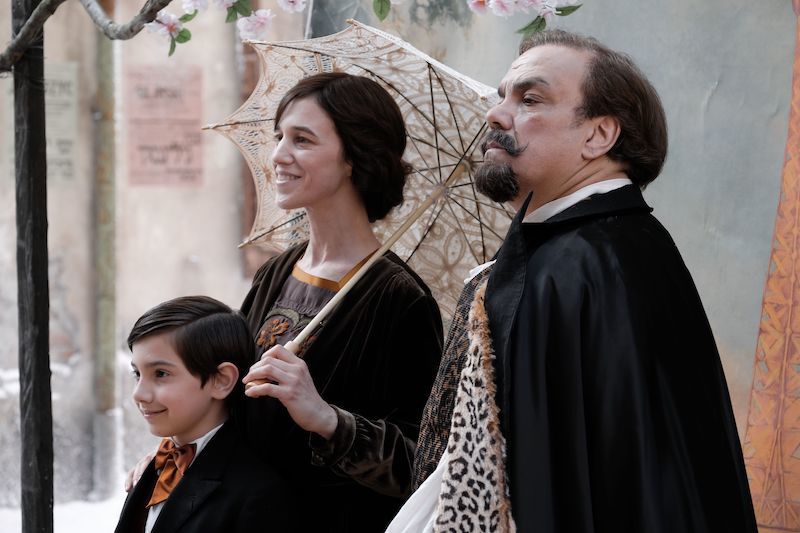A War With Identity
Review of Promise at Dawn, presented at Stroum Jewish Community Center’s Seattle Jewish Film Festival.
Written by TeenTix Newsroom Writer Eleanor Cenname, and edited by Teen Editor Hannah Schoettmer!

Promise at Dawn revolves around the idea of war. Based on the memoir of Romain Gary, the film, included in Stroum Jewish Community Center’s Seattle Jewish Film Festival, portrays both physical and metaphorical manifestations of war that ultimately support the central theme of identity.
The film opens to a shot of a city in Mexico—the streets congested with people with the painted faces typical of The Day of the Dead. A lone car pushes its way through the packed road. A woman exits the car, her severe expression a stark contrast to the raucous celebration around her. She enters a building where she calls for her husband, Romain. She finds him slumped on a balcony, a bandage around his head, and they leave for the hospital. In the car, the woman begins to read the papers Romain, an author, had been writing when she found him and his voice sounds as the screen floods with the view of a boy walking down a snow-covered street. The film cuts to a place of the past—the story of Romain’s life with his Jewish mother and the wars that drive his story.
His mother told him to be a literary genius like Victor Hugo, and that he could not paint because he had to be famous while he was living—unlike Van Gogh who died at thirty-five. Since he was not gifted at the violin, he could not do that either. She said he would be a French Ambassador and would have his suits made in London, and that the only things worth fighting for were love, honor, and France. He had striking ambitions, though what Romain said pushed him most of all were his neighbors; when his mother, Nina, shared her dreams for him and his own aspirations, his neighbors laughed at him, their disdain hyperbolized as they stood on a balcony above Romain and Nina. Romain’s mother fought a war for her son. Meanwhile, Romain fought his own war with boyish love, his pride, and his Jewish identity all while the looming entity of World War I advanced.

While Nina clearly wanted the best for her son, she was a volatile presence in Romain’s life. She worked hard for Romain, but she would also turn and abruptly scream at him only to stop seconds later. When Romain left for college, she followed him onto the train after seeing him with a woman.
As Romain grows older, World War II emerges and he joins the French military, only to face further religious discrimination and fight with his mother—both of which form a marker of his identity. While in active combat, he also publishes a book called Éducation européenne.
Upon his return, Romain finds that his mother had been dead for three years and the letters he had received had been sent by his mother’s doctor to maintain the illusion that she was still alive and to ensure Romain would stay in the army. The film cuts to the present, where a doctor finds Romain has put bread in his ear in response to noise from the Day of the Dead festivities. The saga concludes with Romain finishing his autobiography, in which the flashback portion of the film is portrayed.

The film was periodically accentuated with short contemporary movie clips, though with Romain playing the roles of the heroes in the respective films and therefore fulfilling his mother’s wish for him. These segments further allude to his dreams of fame and power despite how people may understand him as merely a young Jewish boy, but these segments also are evocative of a certain universal innocence possessed by youth. Regardless of the societal restraints Romain faced due to his religion and immigrant status, he imagined himself as a film star, war hero, French Ambassador, and a writer rivaling Victor Hugo.
His innocent dreams juxtaposed with how he is viewed by society create a captivating dichotomy and prompt questions about identity. This film uses the war between Romain’s own ambitions, his mother’s desires for him, and society’s constraints as a platform on which to show that despite where you are born or how you grew up, what is more important is how much you are willing to work for your dreams. I think this message is invaluable for anyone, even today, and especially for teenagers. There is pressure, these days, to go to the best college so you can get the best job. But it is important to examine what we are told, since it influences our ambitions and self-conception.
Promise at Dawn serves as a powerful reminder to follow one’s ambitions, regardless of what society expects, and shows this though the significant historical perspective of World War II through the eyes of a Jewish immigrant.
Lead photo credit: Film still from Promise at Dawn. Courtesy of the Seattle Jewish Film Festival.
The Teen Editorial Staff is made up of 5 teens who curate the review portion of the TeenTix blog and manage the TeenTix Newsroom. More information about the Teen Editorial Staff can be found HERE.
The TeenTix Press Corps promotes critical thinking, communication, and information literacy through criticism and journalism practice for teens. For more information about the Press Corps program see HERE.

